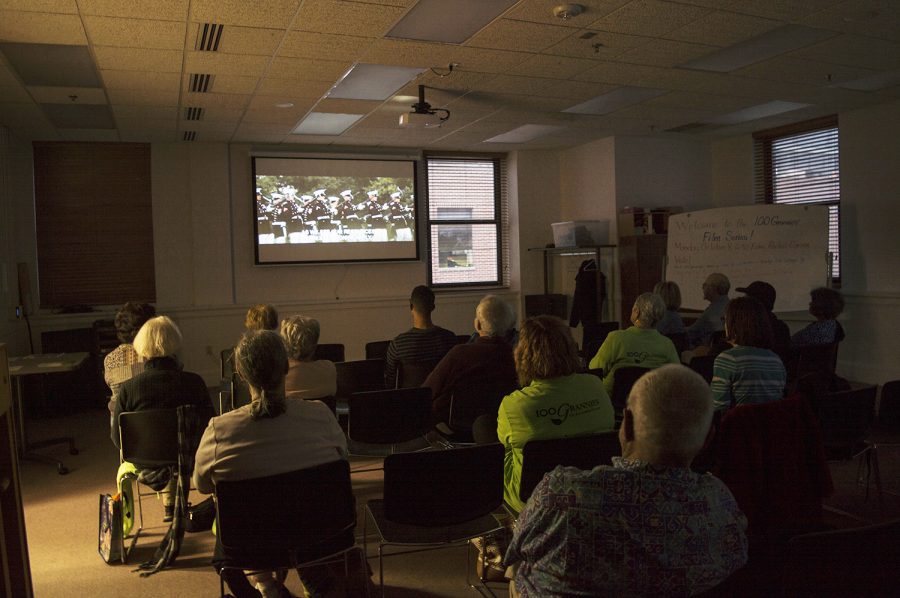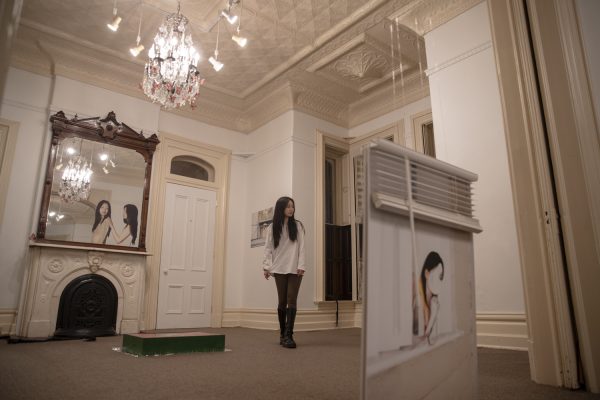100 Grannies seek to education elderly, community through film
The 100 Grannies activist organization is educating through a film series that touches on environmental issues.
The Iowa City Senior Center held a session about how elders learn quicker through watching movies on Monday, October, 1st. There were close to twenty members at the event, and watched a video about how global warming culturally effected the world.
October 3, 2018
The opening sounds of an explosion jarred the group in attendance at the Iowa City Senior Center on Monday night as they prepared to learn from this week’s documentary. The show was <em>The Age of Consequences</em> (2016), a documentary dissecting the impacts of global climate change from a national-security standpoint. This is the first of five films that the Grannies will show each Monday this October at the Center to raise awareness about environmental concerns and sustainability.
The Grannies, or the members of activist organization 100 Grannies, includes elderly women who devote their voices, time, and resources into advocating against fossil fuels. Their Education Committee of the Iowa City chapter uses lecture and film to educate people of all ages.
Becky Hall, one of the founding Grannies of Iowa City, welcomed audience members as they arrived Monday evening. Hall handed out 100Grannies.org pamphlets with a smile, detailing the mission of the grannies and all that they do. The Education Committee member referred to herself as a “rare bird,” having been born, raised, and lived in Iowa City, all the while promoting change. The true local served as the spokeswoman of the night, promoting the grannies, their October film series, and the group as a whole.
“It’s nice to have a group of like-minded women in the community,” Hall said.
Diane Delozier Lahr said she believes that being educated is the most important thing for people to be. The two- and a half-year granny was introduced to the sustainability movement by her son and has been advocating ever since. During her time working with the film series, Delozier Lahr has seen films discussing a range of issues from the environment to food, and housing, among many issues.
“We try to get different [films]; it’s not just the ocean,” Delozier Lahr said and laughed.
The film series is annual but only in October. Last year’s film series dealt with issues of climate change, where food comes from, and the Dakota Access Pipeline. The pipeline was a heated issue in recent years, especially for the grannies. Katharine Nicholson, a founder of Grannies of Iowa City, was proud of the involvement in the protests. The protest resulted in the arrest and release of five grannies.
“The court decided not to fool with us,” Nicholson said.
Becky Hill introduced the screening, which featured gruesome images, war, famine, and a host of abject horrors that struck the audience. Silence covered the room, apart from the occasional gasp, troubled sigh, or exclamation of “wow.” The blunt documentary outlined how climate change causes conflict, which in turn spurs insecurity.
The film was largely sourced by military officials, namely, a retired task force called the CNA Military Advisory Board. The board promotes and conducts research that connects climate change and threats to national security.
RELATED: Local group of grannies help promote sustainability
The rhetoric of the film suggested that climate change breeds environmental instability and a lack of resources, which in turn causes conflict in areas of environmental decay. Iraq, Syria, and Sudan were used as examples: Each area is suffering from climate change and resource shortage, and both have been areas in which extremist groups prey upon the despair of starving peoples.
However, the military proves to be leading sustainable action, despite the lack of support in Washington. The Age of Consequences showed retired and current military officers implementing solar panels and using hydropower technology to cut down on fossil-fuel emissions and contribute less to the cyclical problem.
After the screening in a discussion, the grannies raised concern over the film’s content and the U.S. administration.
One granny broke the silence with, “Are all the films going to be this scary?”
Many in attendance noted that President Trump has said and done frightening things for the environment that may come back to haunt public safety. One granny commented that Trump has said the U.S. should burn as much fossil fuels as it can for its own gain, regardless of the impact. Another granny said Trump’s decision to pull the United States out of the Paris Climate Agreement was deplorable. The consensus was that something needs to change.
The crowd was somewhat sparse, because of the location, said granny Miriam Kashia. The Center is easy to book, but it’s hard to get people to come to in order to engage a wider audience, because many think it is only for the elderly.
“It’s hopeful, we can do this,” Kashia said. “We need 100 people in this room; that’s part of the problem.”
The grannies plan to continue to learn and educate the public on sustainability and climate change through their activism, and through their film series. The next film will be on Oct. 8 at 6:30 p.m.





















